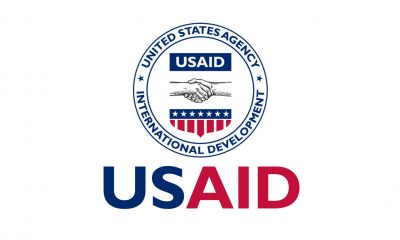Ict/Telecom
Group Seeks Govt, IT Hubs’ Collaboration
A group, Working to Advance African Women (WAAW) in Science, Technology, Engineering and Mathematics (STEM) education has called for collaboration between government and Information Technology hubs to sensitise citizens on their importance.
The Programme Support Associate of the foundation Mrs Sefumi Obayan, made the call in an interview with newsmen in Abuja, Wednesday.
According to her, Information Communication Technology (ICT) has opportunities to offer to citizens which can generate income as well as improve the economy.
“We need more public enlightenment in areas where ICT activities are less; we need to work with key stakeholders like the government, to ensure that the citizens harness the opportunities in ICT.
“We need to build the capacity of the citizens. ICT is growing fast, and some people limit ICT to the use of social media.
“The government needs to demystify this belief, expose the citizens to the opportunities ICT have to offer and partner with information technology hubs, to build the capacity of the citizens,” she said.
The programme support associate said that the group was organising training, and was looking out for states and areas to work with them for the development of ICT.
Obayan said that the group was recruiting trainees from the 36 states of the federation, who in turn would train others to ensure ICT training penetration.
“Our outreach is yielding expected result because we emphasise on training the trainers; those who will go out to reach people the foundation cannot reach.
“Recently, we got information that a secondary school in Warri, Delta, is building a candy dispenser and balloon-powered boat.
“It is impressive; it shows that we are making impact to not just those that we train, but also on those the trainees have trained,” she said.
She said that ICT was growing at a fast pace with increased numbers of technology hubs in the country.
“ICT is spreading fast in the country because in 2013, we had just two IT hubs; but at the moment, we have about 45 hubs across Nigeria.
“We have IT hubs in places like Jos and Kaduna, where we think ICT will ordinarily not reach; this shows that we are promoting ICT in Nigeria and people are accepting it,” Obayan said.
WAAW Foundation trains girls, women in Africa on web development, ICT skills, train STEM teachers, among other mandates.
Ict/Telecom
Technology, Others Responsible For Nigeria’s Bonga Oil Operations
The Managing Director, Shell Nigeria Exploration and Company Limited (SNEPCo), Elohor Aiboni, said Bonga, Nigeria’s first deep-water asset, has recorded major milestones, due to effective leadership, cutting-edge technology, continuous improvement and collaboration with stakeholders.
She noted that since coming on stream in November 2005, Bonga has maintained a track record of production that saw it achieve one-billion-barrel export on February 13, last year.
In her presentation, titled “The Bonga Journey to a Billion Barrels”, at the ongoing 2024 Offshore Technology Conference in Houston, Texas, United States, Aiboni, said: “SNEPCo is grateful for the contributions of all the parties to the Bonga story and we can all be proud of the milestones.
“Bonga has been consistent. In 2014, nine years after coming onstream, it achieved half a billion barrels of crude and doubled it in 2023. We have worked relentlessly to ensure excellent asset management, project and wells delivery and deployment of technology and innovations in our operations”.
According to her, these factors, “coupled with the supportive partnership of the Nigerian National Petroleum Company Limited and our co-venturers – TotalEnergies, EP Nigeria Limited; Nigerian Agip Exploration; and Esso Exploration and Production Nigeria Limited, make Bonga stand out as a world-class investment case”.
She continued that, “SNEPCo also enjoyed the support of the Nigerian Upstream Petroleum Regulatory Commission (NUPRC) and the Nigerian Content Development and Monitoring Board (NCDMB) in the success of Bonga operations”.
Aiboni also listed the challenges of keeping the Bonga Floating Production, Storage and Offloading vessel full as the asset ages and dealing with unexpected developments with subsea wells and equipment.
She said: “SNEPCo responded with a campaign of operational excellence, which among other initiatives, led to the creation of a programme known as the Bonga Business Improvement Plan that continually reviews and identifies improvement initiatives and drives sustainability in operations and upskilling of staff.
“The Bonga success story has been led by Nigerians who have been managing directors of SNEPCo since it was established in 1993, in a deliberate policy by Shell to develop indigenous manpower for deep-water operations in Nigeria.
“Today, some 97percent of the SNEPCo workforce is Nigerian and overall, Bonga has helped to create a new generation of Nigerian deep-water professionals.
“Our vision at SNEPCo remains to be the best deep-water business, powering growth and achieving net zero emissions in line with Shell’s Powering Progress strategy”.
Ict/Telecom
Banks Cut Borrowing From CBN By 44%
Banks’ borrowings from the Central Bank of Nigeria (CBN) fell month-on-month, (MoM) by 44 percent to N12.16 trillion in April from N21.7 trillion in March.
Analysis of latest data from the CBN shows that the 44percent drop represents the first MoM decline in banks borrowing from since January when it increased by 268.7 percent to N3.6 trillion from N976.29 billion in December 2023.
However, further analysis showed that banks’ deposits in the CBN SDF grew MoM by 118.4 percent to N428.97 billion in April from N196.37 billion in March 2024.
Banks make use of the SLF to access liquidity to run their day-to-day business operations while the Standing Deposit Facility window (SDF) on the other hand, is an overnight deposit facility that allows banks to lodge excess liquidity (money) with the CBN and earn interest.
The decline in banks’ borrowing from SLF may reflect an increase in banking system liquidity and also the decision of the apex bank last year to remove the limit on the remunerable daily placements by banks at the SDF.
According to the CBN Governor, Mr. Olayemi Cardoso, the CBN removed the cap on the remunerable SDF to increase activity in the SDF window and manage liquidity.
Ict/Telecom
Expert Highlights Technology Impact On Fintech Industry Growth
A Financial technology expert, Olatunji Akinrinola, has highlighted the exponential growth of the FinTech industry, which according to him, was driven by technological advancements.
Akinrinola made this assertion in a press release recently, where he stressed that the role of technology in driving this exponential growth in the FinTech sector was very outstanding.
According to him, Technology has revolutionised the way financial services are delivered, making them more accessible, efficient, and inclusive.
“Through innovations such as mobile banking, digital payments, and blockchain technology, FinTech companies have been able to reach a larger population and provided them with access to financial services”, he stated.
Akinrinola emphasised the role of technology in enabling financial inclusion, adding: “Technology has democratised access to financial services, particularly in regions with limited banking infrastructure.
“Mobile money platforms and digital wallets have empowered individuals to conduct financial transactions conveniently and securely, without the need for traditional banking services”.
He also underscored the role of Artificial Intelligence (AI) and data analytics in driving innovation within the FinTech industry, noting: “AI-powered algorithms and predictive analytics have revolutionised risk assessment, fraud detection, and customer personalisation in financial services.
“These technologies enable FinTech companies to provide tailored solutions and mitigate risks more effectively, ultimately enhancing the overall customer experience”.
Akinrinola stressed the importance of regulatory frameworks in fostering the growth of the FinTech industry.
“While technology has accelerated the growth of FinTech, it is essential to establish robust regulatory frameworks to ensure consumer protection and maintain market stability. Regulators play a crucial role in balancing innovation with risk management, thereby creating a conducive environment for the sustainable growth of the FinTech sector”, he stated.
Akinrinola underscored the role of technology in driving the exponential growth of the FinTech industry, saying, “Technology has been a game-changer for the FinTech sector, enabling innovation, expanding access to financial services, and driving economic growth.
“As technology continues to evolve, the FinTech industry will undoubtedly play a significant role in shaping the future of financial services ecosystem”.
Corlins Walter
-
Politics8 hours ago
When Women Unite To Pray For SIM
-

 Business6 hours ago
Business6 hours agoUSAID Re-emphasizes Agricultural Collaboration With Nigeria
-

 Featured7 hours ago
Featured7 hours agoWe’ve Only One House Of Assembly Led By Oko-Jumbo, Fubara Clarifies …Signs Into Law N1.188trn Rivers 2025 Budget
-
Business6 hours ago
Agency Partners Foreign Varsity On Climate-Smart Agriculture Advancement
-

 Nation8 hours ago
Nation8 hours agoNUJ backs proposed strike by Lagos-owned media workers
-

 Niger Delta6 hours ago
Niger Delta6 hours agoFouchee Celebrates Asari’s Recognition
-
Niger Delta7 hours ago
NDDC Boss Thanks God For Transformation … Promises More Infrastructural Projects
-
Business6 hours ago
NACCIMA Rep Urges Farmers To Exploit Hybrid Oil Palm Seedlings

